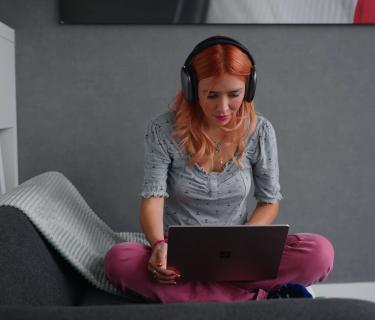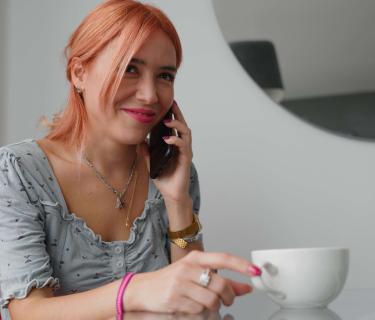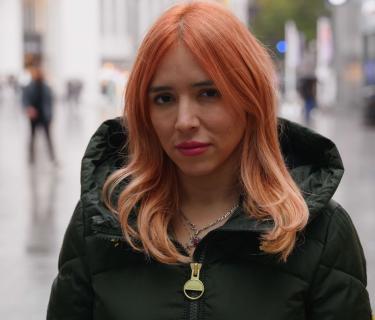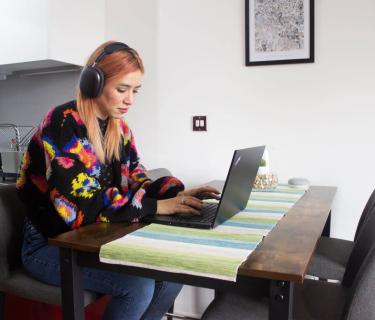As part of Arden University’s Born for This campaign, we caught up with one of our students Natalia, who is a year and a half into her time with us.
Natalia is a Psychology student with a fascinating background. A hairdresser and colourist who has been involved in big fashion week shoots for a number of recognisable names, Natalia was inspired by lockdown to take up studying again and began looking for a place she could get a qualification in Psychology.
Swapping working on the outside of people’s heads to understanding the insides of them, Natalia has found a lot of success during her time distance-learning. You can read more about her story below.
Hi Natalia, what are you studying with us?
I'm studying a BSc in Psychology which involves things like biological approaches, research methods, loads of statistics, developmental theory, and human behaviour.
What's been the most interesting thing or your favourite thing to learn about?
Definitely biological and cognitive, I think that is a really important part of human behaviour. I think you expect psychology to be one thing, but when you actually get involved it’s much wider and you just start analysing everything and analysing yourself as well.
What did you think psychology was going to be like? And was there anything that surprised you?
I didn't expect psychology to be so technical. But at the same time, I really like the structure of it – it is very complete. Also, with the way it changes the way you think, the way you see people, and the way you work it is a very practical degree for everyday use as well, not just only to become a specialist.
What were you doing before you were studying for this? What was your life like?
I've been a hairdresser for 10 years. So, I work a lot with people. We hairdressers are natural psychologists, so obviously studying psychology definitely expands how you approach people and the way you understand and develop more empathy and more understanding.
How did you get into hairdressing?
My father told me to start hairdressing after I finished college. I had always been naturally good at art and beauty, and I used to paint as well. So I started doing it back in the day and I got involved in big shows and fashion weeks.
With the fashion weeks, I used to be an assistant and saw a lot of hairstyles. I got to specialise more as I went on – my sector is colouring so I do a lot of technical work. There was a lot of designers launching collections and needed that hair to be perfect. There was a lot of teamwork and a lot of structure.
Was that kind of pressure stressful?
Sometimes you had shows where you had 30 models and you have to get them ready in 40 minutes. There was no negotiation, so it was a very dynamic place to work.
What made you then want to pivot to psychology then?
Behaviour became my passion! I used to work in a big company where we had a lot of support and a lot of course that covered things beyond just hair. There was a lot of coaching and an environment to help people’s growth.
What drove me to do a degree, is that I love people's wellbeing, when I’m older I would like to do something that provides a contribution to a workspace and mental well-being.
There's a nice symmetry of wanting to go from working on the outside of people's heads…
Yeah, working from the hair into their minds. I think clients often tend to confess things to you that they don't say to the people closest to them. And that's very similar to therapists, isn't it? Because you’re sharing things that are very deep and personal.
I feel that my degree helps me to be more objective though, and perhaps motivate them to be their best, as a friend, as a hairdresser, and as a therapist. So, I feel like that is what I find so much in my world of work.
What were the three most important things for you in a university when you were looking?
Flexibility, support, and the community.
Of course, the accreditations are a big part, but I think the environment helps.
When you think of university you can kind of freak out a little bit, because you know there is a lot of work ahead and it's a big journey.
But the environment here makes it feel possible and it’s like “Yes, I can do this.”
Why did you choose Arden?
I started researching about universities in the lockdown. I went to a couple of presentations of universities, sometimes they do those video calls and things.
I think Arden was the one that gave me the most confidence though. I really liked the presentation, they were really open to questions, and really showed the flexibility in their presentation. I kind of had the feeling like I want to go for it.
Would you have considered distance learning as sort of an option then before the pandemic?
I think that's what made me want to study, because I didn't think I had the time before. I had a lot of time on my hands, even before the pandemic because I was working part time, and I thought I’d like to do something with my time.
When I saw this the learning opportunity, I thought “Oh, this is for me, this is my thing!”
What's your experience been like so far with Arden, how have you found it?
When I did my induction, I was so anxious, but since then it was a very easy, very supportive journey. I mean, it's hard work, but it does pay off.
My experience distance-learning has been very positive. At times it has been challenging, but I always felt supported by the tutors and other students. With distance learning it’s important to create that network of people – teamwork makes the dream work – and it's really exciting and nice to find people like this.
I think it can be very surprising as well. You might think it's too late, but then you find people in their 40s and 50s doing a degree. So, my advice to anyone who's thinking about doing a course or a degree is to go for it.
With the Ilearn portal, you have got your lessons, but there's also skill tutors workshops and one-to-ones so you have the opportunity to work on your references, your writing skills, your critical skills, and how to build an argument: which is very important in psychology.
Was there anything specifically that you will anxious and worried about for you started that you can remember that you were nervous about?
I think what made me nervous the most was going back to studying after a long time, but you have a lot of support. There are no questions that are silly, and there is always a space for questions.
What's been your highlight during your time studying with us as well?
I think when I got my first first-class mark, that was a good achievement. It was like ‘Wow, I can't believe this’. It’s quite addictive.
Were you nervous about missing out on interactions with other students when you started as a distance learner?
When I started, obviously, I didn't know anyone. So that itself made me anxious.
Before I started, I was looking into the forums, trying to find people and groups who were looking for that interaction.
That was a quite quick process and I found these groups, and we’re still together and we still help each other. So, it's great.
Do you feel like studying for a degree has been empowering for you?
I definitely think it’s empowering, absolutely. I gained more confidence, and I feel less judgmental.
I think we assume we know things like anxiety or depression – they’re these big things in society – but when you start digging into what that means in many areas, such as biological ways, or cognitive ways, you start understanding that it's bigger than us. I think that is a great thing I learned.
When you study as an adult too, you kind of see different areas where you can apply that knowledge. That makes you a great candidate for a job in the future, but also it makes you more of a valuable individual. I guess it's definitely empowering in every area of your life.
So, you work part-time still, how have you found combining that with studying?
It is a challenge. I work less days to find the confidence, and as I know better what I'm doing, then I add an extra day.
I'm very organised. So I do my writing assignments on the days off because I have that space of mind in the morning, and I do all my reading and the activities on the go. I always have my iPad with me. I read. I listen to podcasts, I listen to extra things that the university offers such as webinars, it's great to have all that.
Would you tell us a little bit about the volunteering you’ve been doing? What was that like?
The first volunteering project I got involved was Brain Awareness Week, last year, and it was an exciting group, it was great for presentation skills for talking skills. And now at the minute I'm doing volunteering as a lecturing assistant, which is helping tutors to present lessons content, so we have to produce more content in whatever area we like to specialise and present it. So that is a great project, you learn a lot and you make a lot of friends. So that is very exciting.
Where do you think your drive and your motivation comes from?
I think I’m driven by wanting to do better. I get stimulated quite quickly by new things and I think it's always good to improve. I think that's one of my passions, I like improving at new things.
To find out how you could achieve what you were born to do, visit our course pages today







